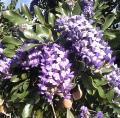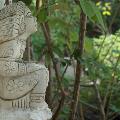
DMT-Nexus member

Posts: 833 Joined: 19-Oct-2010 Last visit: 21-Aug-2023 Location: Planet Earth
|
Hey all, Recently SWIM has obtained some Iboga seeds and will be propagating them soon. Such a sense of glorius wonder and possibility in these seeds. Growing seems to be the only way of obtaining ibogaine in certain oppressive countries unless you are very well connected, and so begins the long road. I have looked on the web and it seems there is very little information on growing and harvesting Iboga. I thought it should be good to start a thread to organize information on this topic. Anyone who has experience or info in growing and/or harvesting Iboga please do contribute. I have a few specific questions in particular... like what is the average growth that can be expected per year with average adequate lighting conditions and fertilizing? How many years does it generally take for the plant to be ready for harvesting? Can the Iboga plant root bark be harvested conservatively and sustainably without killing it, and if so, how long before it can be harvested again? Will update as the seeds progess.. --------------------------------------------------*Kash's LSA Extraction* * Kash's Mescaline Extraction*------------------------------------------------------ All things I say are complete and utter ramblings of nonsense. Do not consider taking anything iterated from the depths of my subconsciousness rationally and/or seriously.
|
|
|
|
|

omnia sunt communia!

Posts: 6024 Joined: 29-Jul-2009 Last visit: 11-Jun-2025
|
Iboga doesn't need intensive lighting. Early growth shouldn't need much/any fertilization, however, older plants can apparently be rather hungry. I've heard at least 5 years for it to reach a size for any sort of harvesting...and depending on your growing circumstances, I could imagine it taking longer. You want a fast draining soil...people have had success with coir/perlite and cactus soil mixes. My understanding is that it is possible to harvest the root sustainably, but I don’t know anything about best practices/methodologies for that. Propagation notes as found on eboka and elsewhere:
Light & temperature requirementsTabernanthe iboga is at home in the rainforests of West Africa. Temperatures here are always above 20deg C and frequently above 40 deg C. In fcat, iboga stops growing at about 15 deg C and looses it's leaves at about 10 deg C. The tips start dying back if exposed to 5 deg C. Repeated exposure to 4 deg C will cause severe dieback from which the plant may not recover. A sinlge frost or a couple of nights at 1 or 2 deg C will certainly kill most plants. The rainforest provides a very moist and humid environment. Iboga plant will adapt to dry air, but will shed their leavs first. The new leaves will be smaller and tougher, but will withstand very dry conditions as long as the plant is watered frequently. Hardened iboga plants can be grown under HPS or other artificial lights. Being rainforest plants they prefer light at levels of less than 70%. Iboga ideally likes about 50% until it is a couple of years old and can then tolerate more. having such low minimum light requirements means that this species can easily be grown along the perimeter of artificial light rigs, where other plants will not be happy. It is also well suited as an indoor pot plant, but should be kept away from windowsills during winter. Soil, water and nutrient requirementsRainforests produce water by causing condensation of moist air in the lower strata of the forest. This keeps the rainforest floor damp at all times. The constant flushing of condensed water means that nutrients are constantly washed away. Most rainforest plants are well adapted to efficiently capture these nutrients in the upper layers of the forest litter and soil. When cultivating plant we should try to emulate this soil by using a light mix of leafmould or composted bark shreddings. Rainforest soils have perfect drainage and this can be a problem in commercial potting mixes. To avoid waterlogging it is wise to add at least 1/3rd coarse sand to the mix. Iboga quickly gets rootbound and needs plenty of space. The efficient rootsystem is also very vigorous and needs rooms to spread. Iboga is a heavy feeder and responds quickly to fertilising. Soluble fertilisers are a waste here due to high water requirement. Composted manures are perfect. Natural propagation and germinating seedThere was a fair bit of seed available until the end of 1999. Most of this was supplied to retailers by Dan Lieberman (South Africa) who tragically died in a car accident mid 2000. Most seed sold around the world since then has been from old stock. Shaman Australis has now sourced a new supplier and is making seed available on a seasonal basis. Iboga seed is VERY perishable. In poor storage conditions it can loose it's viability within a few weeks. If kept at optimum conditions it will last about 4 months. To store seed properly it needs to be stored in a moist environment at about 10 degC. This prevents the seedcoat from drying out. Very fresh and moist iboga seed germinates easily and without problems. As soon as the coat dries somewhat the seedling will struggle to emerge from the seedcoat and may rot. The seedling can be assisted by keeping the seedcoat very moist and soft, or by using a scalpel to carefully remove sections of seedcoat on a day by day basis. A piece of wet cotton or fabric can be used to keep the seedcoat moist by draping it over the emerging seedling. A high humidity environment (humidity dome or tropical hothouse) is essential. If using a scalpel to help the seed it is important never to injure the cotyledons that are folded into the tiny folds of the seedcoat. Accessing 1mm per day is all that is needed and prevents excessive damage. As you ease the constriction with the scalpel, the seedling will slowly push itself out a little further, thus revealing the next safe place to cut another 1mm. trying to remove the whole seedcoat at once is almost guaranteed to fail. You should aim to remove the seedcoat within about a week of the seedling emerging from the growing medium, as any longer may weaken the seedling beyond recovery. Under normal circumstances the seedling will shed the seedcoat within 2 days and this is the minimum it should be allowed to try without interference. To germinate the seed you will need to prepare a tray, pot or punnet with coarse sharp sand (please look up the exact preparation, as most other media and plain sand are entirely unsuitable). The punnet, pot or tray has to be perfectly free draining, which can be achieved by placing plastic shadecloth in the bottom to prevent the sand from escaping. The sand has to be at least 5cm deep. Place the seed in the coarse sharp sand about 10mm deep and water well. Never let the sand dry out, as if the seedling is about to emerge at this time it will dry up and die. Also, if the medium dries, the seedcoat may dry and prolong germination. Keep seed at a minimum 25 deg C air temp. However, to achieve good germination the air temp should be about 30-35 deg C. Lowering the temperature will delay germination and increase likelyhood of fungal attack. Germination may occur within a few days, but may take up to several months, so be prepared to keep looking after the seeds throughout their full germination phase. Never expose seedlings to dry air until they have at least 3 sets of leaves. This is also the best age to transplant the first time. Their first new growing medium should be mostly sand (90% coarse sand + 10% good potting mix) and should not contain ANY manure or other strong fertiliser. Osmocote is a good option here, but should be applied at minimal rate. Once the plants get to 5 pairs of leaves they are ready for strong growth and normal fertilising and should be potted into a mix as described in the section above. Striking cuttingsIboga cuttings are fairly easy to root. Take a stem section with two nodes. Remove the leaves from the lower node and cut off 2/3rds of each remaining leaf. Now insert the lower end into a tray or pot of coarse sharp sand. Rooting hormone makes no difference in this process. Put the pot or tray in a hothouse or humidity dome and keep moist, humid and very warm. Callus forms after about 10 days and roots emerge after another few days. Pot into a sandy potting mix after 4-6 weeks or when the plant has grown by another node. Plastic-Bottle-HothouseA cheap and easy hothouse can be made from a softdrink bottle. This is possibly the most perfect way to establish your cuttings. The bottle used should be at least 500ml. If it is larger than 1l, then the air might be a little too dry for the cutting, but it will still work. Choose a pot with a diameter a little larger than the diameter of your bottle. Fill the pot with coarse sharp sand, and place the single node cutting at least 3 cm into the medium (note: plant shown here is NOT iboga - this method can be applied to may different plants. Growing medium shown is not sand.). Cut the bottom off the CLEAN plastic bottle and push it about 2-3 cm into the medium. The plastic cap can be used to adjust the humidity and temperature inside this min-hothouse. It is advisable to never close the vent completely, but for the first couple of weeks it is best to cover the hole partially to increase humidity. Place only one cutting per unit to avoid overcrowding. Watering can be done throught hole, or the bottle removed for maintainance. Looking after potted plantsMost collectors will start their plants in pots as these can be placed into appropriate conditions without disturbing the roots. Iboga likes a lot of nutrients and will need plenty of root space. Make sure that the soil never dries out as rainforest plants have no protection from excessive transpiration. Plants can also be hardened off to survive in non-humid conditions. To do this without stressing the plant too much, remove all the leaves from the well established plant, leaving only the tiny growing tips. Now place this plant into a dry but shady spot and always water it well. As the new leaves grow they will be much harder and smaller. Fertilise only when it is hot enough for the plant to actively grow. Composted manures are preferable to liquid fertilisers, but both will achieve results. Regular repotting into larger pots allow the addition of manure to the new potting mix. Wiki • Attitude • FAQThe Nexian • Nexus Research • The OHTIn New York, we wrote the legal number on our arms in marker...To call a lawyer if we were arrested. In Istanbul, People wrote their blood types on their arms. I hear in Egypt, They just write Their names. גם זה יעבור
|
|
|

DMT-Nexus member

Posts: 833 Joined: 19-Oct-2010 Last visit: 21-Aug-2023 Location: Planet Earth
|
Fantastic Snozzleberry! This is great information, thankyou. Hopefully somebody will come forward and comment on sustainable harvest of Iboga roots. Anyone with experience here? --------------------------------------------------*Kash's LSA Extraction* * Kash's Mescaline Extraction*------------------------------------------------------ All things I say are complete and utter ramblings of nonsense. Do not consider taking anything iterated from the depths of my subconsciousness rationally and/or seriously.
|
|
|

DMT-Nexus member
 
Posts: 12340 Joined: 12-Nov-2008 Last visit: 02-Apr-2023 Location: pacific
|
I have 5 seeds here also I am going to build a small greenhouse chamber to germinate inside..big enough for them to be there for at least a year or 2 and then I will upgrade or something I guess. Once I get my greenhouse outback heated maybe they can go in there full time but I dunno.. Long live the unwoke.
|
|
|

DMT-Nexus member

Posts: 833 Joined: 19-Oct-2010 Last visit: 21-Aug-2023 Location: Planet Earth
|
Well failed an attempt at sprouting two seeds in a sprouting chamber. They stayed moist for two weeks and then mold was seen growing on them. Hopefully the seeds I bought are still viable.. Going to try my other sprouting chamber design with two more seeds and plant two others. Hopefully will have better luck. Maybe the seeds should be soaked in warm water for a day before attempting to germinate?  --------------------------------------------------*Kash's LSA Extraction* * Kash's Mescaline Extraction*------------------------------------------------------ All things I say are complete and utter ramblings of nonsense. Do not consider taking anything iterated from the depths of my subconsciousness rationally and/or seriously.
|
|
|

DMT-Nexus member
 
Posts: 372 Joined: 29-Sep-2009 Last visit: 15-Feb-2024 Location: Diagonally parked in a parallel universe
|
A couple of points here. Re: Sustainable root harvesting; the plant is relatively new in cultivation outside Gabon and many people (me included) have failed to keep them alive past the seedling stage. That said, I would expect the habitus of the root system to be different when grown in pots vs. in habitat. It is said to take a minimum of five years, preferably ten till roots are of harvestable size. So if anyone out there has managed to get that far with them, they are a rare individual indeed. I know of some grown in the ground in Hawaii, but most of us will be limited to growing it as a houseplant or in a GH. So what this boils down to is I wouldn't expect a lot of replies to this question. As far as germing the seeds, yes dried seeds are prone to rot. The dried seeds I got seemed to have an extraordinarily high mold load. Fresh seeds, especially still in the pod don't seem to have that problem. There is at least one vendor that offers fresh pods There are a few things you can do. A brief soak in dilute bleach (and then rinsed) or a longer soak in H2O2 (rinsing not necessary)can help reduce the spore count. Also, germinating in a bed of sphagnum moss helps because sphagnum naturally inhibits mold and bacterial growth. I would use RO or distilled water, not tapwater to moisten the germination media. As soon as they sprout remove from the sphagnum and place in your seedling mix. Having mold on the seedcoat while germinating is not always a problem but it certainly can be. You might try rinsing the ones you started with some H2O2 before the fungus penetrates the seedcoat and attacks the embryo. If the seed is still firm it is probably OK. If it's squishy it's dead. Lastly, they can take up to 4 or 5 months to germinate. Some come up right away, but some are real stragglers so don't give up on them. I had one take five months 'til it popped, and that was fresh from the pod. There are others better qualified to guide you on this and I hope they stop by. While I had good germ rates on the fresh seed, I misjudged on how light the mix needs to be. It needs to be very well draining indeed. And even when given optimal conditions, I have heard of ibo taking two years before they really gain traction and start growing robustly. So be prepared and keep us updated.  I already asked Alice.
|
|
|

DMT-Nexus member
Posts: 117 Joined: 11-Aug-2013 Last visit: 21-Jun-2019 Location: The other side
|
Hi I have just put some really fresh Iboga seeds in pots and i hope some will make it. One of the seeds had already sprouted in the moist sphagnum moss when i planted them in soil. I made a thread with some pics about it in the botanical section. Are we allowed to share suppliers? If so send me a PM if interested in fresh Iboga seeds. Grower. Growing active and sacred plants and mushrooms is fun.
Chemistry and technology is fun.
Anger, violence and restricting rules are NO fun...
|
|
|

DMT-Nexus member
Posts: 288 Joined: 19-Sep-2012 Last visit: 30-Nov-2017
|
I know Share the Seeds website is currently requesting iboga seeds  No one there seems to have any... Edit: Actually, it may be Diplopterys Cabrerana that im recollecting “The swans go on the path of the sun, they go through the ether by means of their miraculous power; the wise are led out of this world, when they have conquered Mara (desire) and his train" Dhammapada
"But is it probable," asked Pascal, "that probability gives assurance? Nothing gives certainty but truth; nothing gives rest but for the sincere search for truth"
|
|
|

plant enthusiast
Posts: 93 Joined: 06-Mar-2013 Last visit: 17-May-2016 Location: planet earth
|
Hi all I recently purchased fresh iboga seed too. I have six standing seedlings without the seed shell so far. Two different soil mixes. Hopefully both mixes suffice but I guess its a better chance that one or the other is more optimal. One mix is seed stater mix alone right from the store and the other is potting mix with extra perlite and seed starter mixed in to lighten up the soil. Hopefully some seedlings make it past the seedling stage. Most tropicals I have love it here so I'm most hopeful. I want them to survive so bad and I know they obviously want to survive and grow so I'm keeping the positive outlook that I will succeed! This has been along time coming and I will not fail...I want them too much. However good grow vibes never hurt!
|
|
|

Not I

Posts: 2007 Joined: 30-Aug-2010 Last visit: 23-Sep-2019
|
I wonder if it makes sense to try and grow them in a DWC hydro setup since this would allow maximum root development in the smallest possible space.... Of course you would want to flush with pure water for quite awhile.... If there is concern about to much water then what about a dutch bucket setup or Nutrient film on a slower timer? Just food for thought... If your religion, faith, devotion, or self proclaimed spirituality is not directly leading to an increase in kindness, empathy, compassion and tolerance for others then you have been misled.
|
|
|

omnia sunt communia!

Posts: 6024 Joined: 29-Jul-2009 Last visit: 11-Jun-2025
|
joedirt wrote:I wonder if it makes sense to try and grow them in a DWC hydro setup since this would allow maximum root development in the smallest possible space.... Of course you would want to flush with pure water for quite awhile....
I've been thinking about this for a while and hope to try in the not-too-distant future. I don't think "too much water" would be an issue as long as aeration is adequate. I've gotten P. alba to grow just fine in DWC setups. Wiki • Attitude • FAQThe Nexian • Nexus Research • The OHTIn New York, we wrote the legal number on our arms in marker...To call a lawyer if we were arrested. In Istanbul, People wrote their blood types on their arms. I hear in Egypt, They just write Their names. גם זה יעבור
|
|
|

DMT-Nexus member

Posts: 1711 Joined: 03-Oct-2011 Last visit: 20-Apr-2021
|
To maximize oxygen and root development, aeroponics is an interesting alternative too. "The Menu is Not The Meal." - Alan Watts
|
|
|

omnia sunt communia!

Posts: 6024 Joined: 29-Jul-2009 Last visit: 11-Jun-2025
|
Yea, I asked a guy who did a presentation on iboga if he knew whether hydro/aero setups had any impact on %alks, but he didn't know. Guess we'll just have to try it and see  Wiki • Attitude • FAQThe Nexian • Nexus Research • The OHTIn New York, we wrote the legal number on our arms in marker...To call a lawyer if we were arrested. In Istanbul, People wrote their blood types on their arms. I hear in Egypt, They just write Their names. גם זה יעבור
|
|
|

DMT-Nexus member
 
Posts: 372 Joined: 29-Sep-2009 Last visit: 15-Feb-2024 Location: Diagonally parked in a parallel universe
|
SnozzleBerry wrote: I've been thinking about this for a while and hope to try in the not-too-distant future. I don't think "too much water" would be an issue as long as aeration is adequate. I've gotten P. alba to grow just fine in DWC setups. P. alba is an order of magnitude easier to grow than ibo, so you can't use it as a basis for comparison. That said, DWC is definitely worth trying. It might well solve some of the problems experienced with growing ibo, primarily the need for lots of water without the substrate getting waterlogged. Give it a go and let us know! I already asked Alice.
|
|
|

DMT-Nexus member

Posts: 1843 Joined: 28-Jun-2012 Last visit: 20-Jul-2021
|
Some Notes on growing: Seed storage: keep sealed in a baggie in a refrigerator, for example, the vegetable crisper bins. Seed starting: Soak in warm water (~85F) for 24-48 hours. Then soak for 24 hours in diluted H202 (about 2-3caps of 3% H202 to 300mL water), followed by a quick 70% IPA wash to clean the seeds. Soil: 20% worm castings, 80% coarse sand. Pasteurize sand in oven at 350F for about 20 minutes. Cool the sand, mix with worm castings. Put soil in non-draining container. Soak soil with clean water until mostly damp but not over-saturated. Drain off excess water if necessary. (exactly what you would do for cacti seeds) Plant seeds just below surface. Cover with a layer of Sphanghum moss. When starting the seeds, make add a cap or two of H202 to about 400mL of water. Soak the moss in this. Ring out any excess moisture before covering the sand and seeds. Mist moss layer every other day or so. Check that the sand has not dried out. It should always be damp, never dry. Keep the seeds at about 85F and 100% humidity. When plant is 4-5" tall, repot into same soil mix. Keep soil damp. This method has been working very well for me. ~wap~ For Example: wearepeople attached the following image(s):  ti.jpg (114kb) downloaded 652 time(s).+ ---- + ---- + ---- + ---- + ---- + ---- + ---- + ---- DMT Nexus Research ---- + ---- + ---- + ---- + ---- + ---- + ---- + ---- +
|
|
|

DMT-Nexus member

Posts: 833 Joined: 19-Oct-2010 Last visit: 21-Aug-2023 Location: Planet Earth
|
Brilliant, these seeds are indeed hard to grow. Thanks for the tutorial wearepeople.  --------------------------------------------------*Kash's LSA Extraction* * Kash's Mescaline Extraction*------------------------------------------------------ All things I say are complete and utter ramblings of nonsense. Do not consider taking anything iterated from the depths of my subconsciousness rationally and/or seriously.
|
|
|

DMT-Nexus member
Posts: 190 Joined: 19-Jan-2012 Last visit: 26-May-2017
|
Do we have any information regarding the age at which the plants contain sufficient levels of alkaloids for preparation/extraction? Was asked this by a friend and am feeling slightly overwhelmed by the huge number of alkaloids listed in the literature. I'd also appreciate it if anyone had info on the relative composition of alkaloids, in other words, is there some sort of seasonal/cyclical variation such as seems to be the case for some Acacia species, or is it fairly consistent after a certain age? "Becoming a person of the plants is not a learning process, it is a remembering process. Somewhere in our ancestral line, there was someone that lived deeply connected to the Earth, the Elements, the Sun, Moon and Stars. That ancestor lives inside our DNA, dormant, unexpressed, waiting to be remembered and brought back to life to show us the true nature of our indigenous soul" - Sajah Popham.
|
|
|

Homo discens
Posts: 1827 Joined: 02-Aug-2012 Last visit: 07-Aug-2020
|
I am not the most experienced person when it comes to propagating plants from seed, particularly plants that are as picky about their growing conditions as T. iboga, but I have recently come into possession of a few seeds so I will be trying my hand at cultivating this noble plant teacher. Thank you all for the excellent advice throughout this thread 
|
|
|

Another Leaf on the Vine
Posts: 554 Joined: 29-Jul-2013 Last visit: 26-Aug-2023
|
I just found this thread, as I might be starting my own attempt in the not-too-distant future... Excellent advice, and I wanted to add this snippet from "Garden of Eden": Snu Voogelbreinder wrote:Prepare seeds for germination by soaking in hydrogen peroxide [2% solution] for 1 hour, and remove all traces of pulp from seeds. Sow between moist paper towels [sealed in a zip-lock bag or wrapped in plastic if in a cold, dry environment] or in sterilised river sand in a humidity chamber, and keep in a warm, bright place. Check for mouldy seeds, and change paper towels if discoloured. Seed may take from 10 days to two months to germinate; at first sign of such, sow 2.5cm deep in sterilised seed compost, and water with 25% fungicide solution. When established, transfer to a pot or ground plot in compost; benefits from occasional fertilisation. Keep soil wet, but not waterlogged. Outside of its natural habitat, the plant will grow under 25% shadecloth in a greenhouse that gets good sun exposure, with high [c.70%] humidity inside the greenhouse. Leaf propagation [see Psychotria] might possibly be a viable option for cultivating this plant without seed (pers. comms.). The "25% fungicide solution" sounds pretty fierce...! “I sometimes marvel at how far I’ve come - blissful, even, in the knowledge that I am slowly becoming a well-evolved human being - only to have the illusion shattered by an episode of bad behaviour that contradicts the new and reinforces the old. At these junctures of self-reflection, I ask the question: “are all my years of hard work unraveling before my eyes, or am I just having an episode?” For the sake of personal growth and the pursuit of equanimity, I choose the latter and accept that, on this journey of evolution, I may not encounter just one bad day, but a group of many.”
― B.G. Bowers
ॐ
|
|
|

Another Leaf on the Vine
Posts: 554 Joined: 29-Jul-2013 Last visit: 26-Aug-2023
|
OK, I'm not tempting fate by starting an Iboga Grow-log just yet, but it's 14 days since I planted my 10 seeds following Wearepeople's technique exactly. They're in an electric propagator which is struggling to hold 77F/25C... So, today I exhumed the seeds. None were mouldy, and 2 had just split and were left in place. The other 8 I transferred to a petri-dish packed with damp sphagnum moss, and sealed in a larger baggy, which I've placed above the hot-water heater (85-90F/29-32C). As soon as I see any rootlets, they'll go straight back into the sand. “I sometimes marvel at how far I’ve come - blissful, even, in the knowledge that I am slowly becoming a well-evolved human being - only to have the illusion shattered by an episode of bad behaviour that contradicts the new and reinforces the old. At these junctures of self-reflection, I ask the question: “are all my years of hard work unraveling before my eyes, or am I just having an episode?” For the sake of personal growth and the pursuit of equanimity, I choose the latter and accept that, on this journey of evolution, I may not encounter just one bad day, but a group of many.”
― B.G. Bowers
ॐ
|